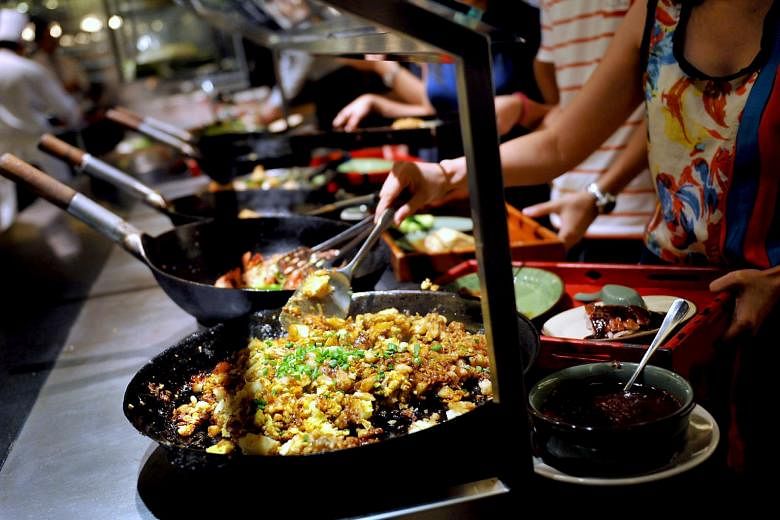SINGAPORE - If there is one fear people in Singapore have when they play host at the holiday season, it is likely that there is not enough food to go around for their guests.
This is borne out by findings of a survey commissioned by the National Environment Agency (NEA), which found that four in 10 respondents - or 41 per cent - said they would cater for more guests than expected when they are hosting.
Another four in 10 said they would prepare just enough food for the expected number of guests.
The remaining two in 10 people said they do not cater for enough people.
The findings of the study were released by the NEA on Monday (Dec 23) to encourage Singaporeans to reduce food waste during the festive season.
The survey, which involved 1,000 Singapore residents who were interviewed face-to-face between March and April this year, sought to better understand consumer perceptions, behaviours and attitudes towards food waste.
A similar survey of 1,000 individuals was conducted in 2015.
A comparison of the survey results in both years showed that people here are more aware of the issue of food wastage and more active in reducing food wastage now than they were four years ago.
For instance, about 56 per cent of those surveyed said they would take away unfinished food when eating out, up from 44 per cent in 2015.
Close to one-third of respondents - or 32 per cent - also said they were open to buying fruits and vegetables with slight imperfections when grocery shopping, compared to less than one-quarter of respondents - or 23 per cent - four years ago.
The percentage of interviewees who were open to buying food close to their expiry dates at a discount also more than doubled, from 18 per cent in 2015 to 38 per cent this year.

About 3 per cent were also composting their food waste at home.
Those surveyed said that saving money (93 per cent) and protecting the environment (92 per cent) were their key motivations in reducing food wastage.
Four in five people wanted more information on how to reduce food waste.
The NEA said in a statement on Monday: "Many thought that more information, such as how to store food and ingredients to make them last longer and how to share excess food, could help them reduce food wastage.
"They also said they would waste less food if they had the option to order smaller portions at eating establishments."
Last year, 763,100 tonnes of food waste were generated - about a 5 per cent drop from the 809,800 tonnes thrown out in 2017.
Non-governmental organisation Food From The Heart, for one, has been redistributing surplus food to the underprivileged in Singapore through almost 200 food distribution points.
Foodscape Collective, a community for sustainable food systems, has been encouraging people to turn food scraps into compost.
Since its launch earlier this year, the Towards Zero Waste Grant has supported about 270 of such ground-up events and projects, including around 130 activities to raise awareness of and drive action to reduce food waste.
The government grant supports individuals, interest groups, corporations, and non-governmental and grassroots organisations in driving waste reduction and recycling initiatives.
How to do your part
Here are some tips to reduce food waste this holiday season.
- Avoid preparing more food than needed for gatherings. It is generally considered safe to cater 10 per cent to 15 per cent less than required for the number of guests expected.
- Opt for less rice or noodles when preparing food for gatherings. Carbohydrate items are the most commonly wasted dishes.
- Avoid giving perishable items as gifts.
- Use leftover food for a meal.
For more tips on reducing food waste and interesting recipes that make use of leftovers, go to the NEA's guide that can be downloaded at cgs.gov.sg/programmes/food-waste-reduction-programme.
Businesses such as food and beverage operators and supermarkets are also encouraged to implement food waste minimisation practices, such as offering smaller portion sizes and selling expiring food at lower prices, or donating them to the needy.
Food business operators can download the NEA's food waste minimisation guidebooks developed for food retail establishments, food manufacturing establishments and supermarkets at www.nea.gov.sg/food-waste-management.
Parties interested in doing their part to fight food waste can go to the NEA Food Waste Management webpage for more information on areas of collaboration, or contact the NEA for more information.


